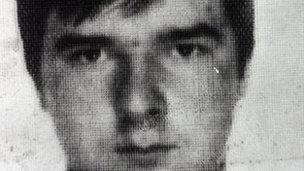Pearse Jordan's family granted legal bid over inquest
- Published

Pearse Jordan was shot by police officers in November 1992
The family of an IRA man shot by police have won legal permission to attempt to have inquest findings quashed.
A High Court judge granted leave to seek a judicial review of the verdict reached by a jury at the tribunal into the death of Pearse Jordan.
He held that lawyers for the dead man's relatives had established an arguable case.
Jordan was killed in disputed circumstances on the Falls Road in Belfast in 1992.
Witnesses claimed the police shot him in the back as he tried to flee after the stolen car he was driving was rammed.
His death was one of several high-profile cases in Northern Ireland involving allegations of a 'shoot-to-kill' policy operated by the security forces.
Last October, a long-delayed inquest failed to reach agreement on key aspects.
The jury was split on whether reasonable force was used in the circumstances, the state of belief on the part of the officer who fired the fatal shots, and whether any alternative course of action was open to him.
They did agree that Jordan was shot by a Royal Ulster Constabulary (RUC) officer after he got out of a red Ford Orion car that had been forcibly brought to a stop on the Falls Road.
Jurors also endorsed the findings of a post-mortem examination that he died of a bullet wound to his chest.
Lawyers for the Jordan family have claimed the inquest was unfair and want a new hearing ordered.
Their wide-ranging challenge deals with the rulings of the coroner and a police decision not to provide the family with full disclosure of all documentation.
'Hopelessly divided'
A declaration is also being sought that the involvement of RUC Special Branch officers and a former police intelligence officer in the Police Service of Northern Ireland Legacy Unit compromised the independence of the process and meant that the inquest was not compliant with Article Two of the European Convention on Human Rights.
According to the family's legal team, it was wrong to sit with a jury whose verdict was described as "hopelessly divided in circumstances where the verdict could not and did not determine any issue in contention".
Other grounds of challenge include:
Non-disclosure of the Stalker-Sampson Reports into alleged shoot-to-kill cases in Northern Ireland
The decision not to discharge a particular juror
Alleged shortcomings in the questions furnished to the jury
Alleged shortcomings in the coroner's directions to the jury
Decisions on anonymity and screening of security force witnesses
Counsel for the coroner argued that the inquest met all legal requirements.
However, Mr Justice Stephens ruled on Thursday that the challenge had passed the first hurdle and can proceed to a full hearing in the autumn.
He granted leave to apply for a judicial review on all grounds except anonymity and screen, which will be determined in September.
The judge acknowledged the case involved complex legal issues but said the issues have "considerable public significance".
He added: "A judgment giving leave is no indication of the ultimate outcome which must await all the evidence and the full arguments at the hearing of the application."